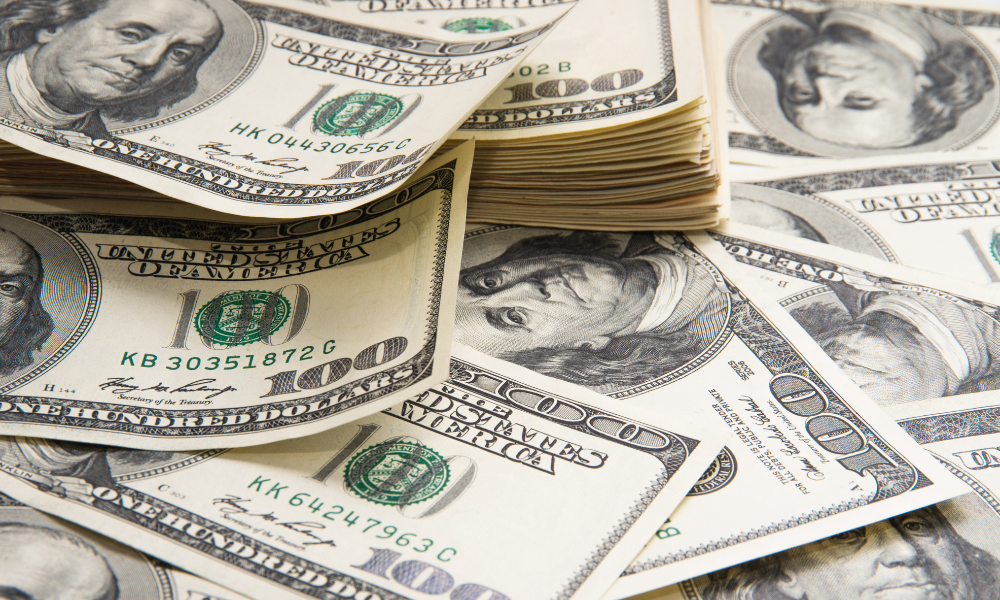

A top-performing Invesco Ltd. money manager has beefed up her bearish bets against the dollar to the highest level in months on expectations that President Donald Trump’s tariffs will dent US growth.
“Our biggest concern is that this actually can be a really big, dollar negative story,” said Kristina Campmany, a senior portfolio manager at Invesco, in an interview ahead of the planned launch of the US administration’s reciprocal levies on Wednesday. “From the get-go, we have been more concerned about the growth-negative impact of tariffs.”
A Bloomberg gauge of the dollar is down nearly 3% since the beginning of the year for its worst annual start since 2017, rattling global investors who bet Trump’s economic policies would juice US growth. The US currency fell for a second session ahead of Trump’s announcement, scheduled for 4 p.m. New York time.
Campmany, who helps oversee an Invesco international bond fund that beat 91% of peers in the past year, expects further declines ahead. Her funds’ short exposure to the dollar — principally through bullish bets on the yen and euro — is back to levels it last held before the US presidential election.
“Dollar bulls may get tariff relief into the April 2 deadline, but beyond the highly volatile narrative on levies, the turning US cyclical outlook and Europe’s compelling fiscal response justify a more bearish medium-term dollar view.”
- Audrey Childe-Freeman and Thinh Nguyen, BI strategists
The dollar’s slide could accelerate as investors rotate out of US assets on worries over the economic impact of tariffs and as Europe pivots to greater outlays on infrastructure and defense, according to Campmany. “The fiscal spending out of Germany is obviously a game changer,” she said.
In the derivatives market, hedge funds have sharply cut long dollar wagers from a recent peak in January but remain bullish on the US currency, according to positioning data published by the Commodity Futures Trading Commission.
“There’s a large, long dollar overhang,” Campmany said.
The wide-reaching nature of Trump’s tariff threats differentiates the global risks investors and companies face today from those during his first term, when economies could more easily substitute goods and re-order trading relationships, Campmany added.
“When you have this across the board — whatever it is that we’re going to get this afternoon — that’s not really an option anymore,” Campmany said.
Based in New York, Campmany also manages Invesco’s $1.5 billion Global Strategic Income Fund, which has outperformed 89% of peers over the last year. Among her money-making calls last year was an underweight position in Japanese government bonds as yields climbed alongside rising interest rates.
Invesco more broadly oversees some $1.9 trillion in total assets and about $288 billion in fixed-income assets.

It's a showdown for the ages as wealth managers assess its impact on client portfolios.

CEO Ritik Malhotra is leveraging Savvy Wealth's Fidelity partnership in offers to Commonwealth advisors, alongside “Acquisition Relief Boxes” filled with cookies, brownies, and aspirin.

Fraud losses among Americans 60 and older surged 43 percent in 2024, led by investment schemes involving crypto and social manipulation.

The alternatives giant's new unit, led by a 17-year veteran, will tap into four areas worth an estimated $60 trillion.

"It's like a soap opera," says one senior industry executive.
RIAs face rising regulatory pressure in 2025. Forward-looking firms are responding with embedded technology, not more paperwork.
As inheritances are set to reshape client portfolios and next-gen heirs demand digital-first experiences, firms are retooling their wealth tech stacks and succession models in real time.
